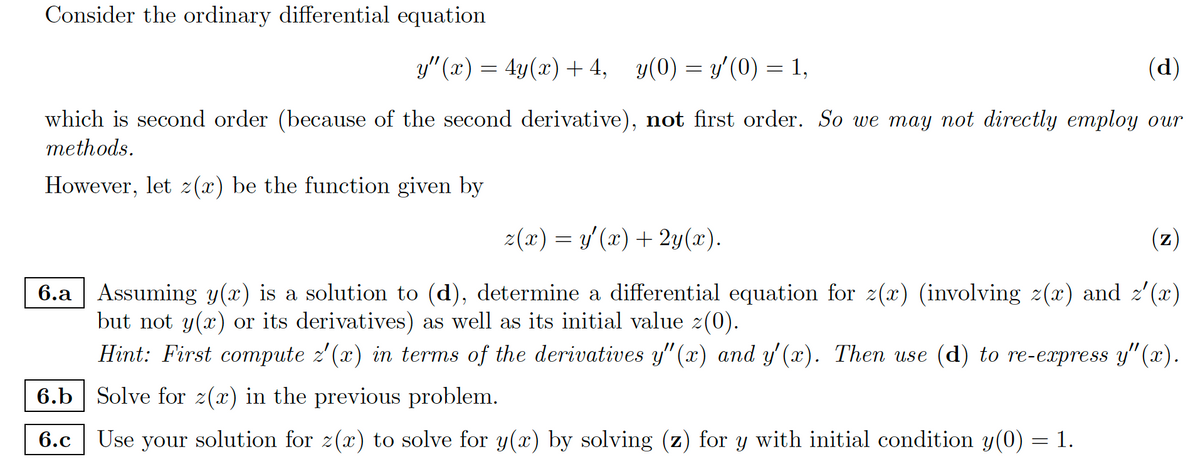Consider the ordinary differential equation y" (x) = 4y(x) + 4, y(0) = y'(0) = 1, (d) which is second order (because of the second derivative), not first order. So we may not directly employ our methods. However, let z(x) be the function given by z(x) = y'(x) + 2y(x). 6.a Assuming y(x) is a solution to (d), determine a differential equation for z(x) (involving z(x) and z'(x) but not y(x) or its derivatives) as well as its initial value z(0). Hint: First compute z'(x) in terms of the derivatives y" (x) and y'(x). Then use (d) to re-express y"(x). 6.b Solve for z(x) in the previous problem. 6.c Use your solution for z(x) to solve for y(x) by solving (z) for y with initial condition y(0) = 1.
Consider the ordinary differential equation y" (x) = 4y(x) + 4, y(0) = y'(0) = 1, (d) which is second order (because of the second derivative), not first order. So we may not directly employ our methods. However, let z(x) be the function given by z(x) = y'(x) + 2y(x). 6.a Assuming y(x) is a solution to (d), determine a differential equation for z(x) (involving z(x) and z'(x) but not y(x) or its derivatives) as well as its initial value z(0). Hint: First compute z'(x) in terms of the derivatives y" (x) and y'(x). Then use (d) to re-express y"(x). 6.b Solve for z(x) in the previous problem. 6.c Use your solution for z(x) to solve for y(x) by solving (z) for y with initial condition y(0) = 1.
Advanced Engineering Mathematics
10th Edition
ISBN:9780470458365
Author:Erwin Kreyszig
Publisher:Erwin Kreyszig
Chapter2: Second-order Linear Odes
Section: Chapter Questions
Problem 1RQ
Related questions
Question

Transcribed Image Text:Consider the ordinary differential equation
y"(x) = 4y(x) + 4, y(0) = y'(0) = 1,
(d)
which is second order (because of the second derivative), not first order. So we may not directly employ our
methods.
However, let z(x) be the function given by
z(x) = y'(x) + 2y(x).
(z)
6.a Assuming y(x) is a solution to (d), determine a differential equation for z(x) (involving z(x) and z'(x)
but not y(x) or its derivatives) as well as its initial value z(0).
Hint: First compute z'(x) in terms of the derivatives y"(x) and y'(x). Then use (d) to re-express y"(x).
6.b Solve for z(x) in the previous problem.
6.c
Use your solution for z(x) to solve for y(x) by solving (z) for y with initial condition y(0) = 1.
Expert Solution
This question has been solved!
Explore an expertly crafted, step-by-step solution for a thorough understanding of key concepts.
Step by step
Solved in 6 steps

Recommended textbooks for you

Advanced Engineering Mathematics
Advanced Math
ISBN:
9780470458365
Author:
Erwin Kreyszig
Publisher:
Wiley, John & Sons, Incorporated

Numerical Methods for Engineers
Advanced Math
ISBN:
9780073397924
Author:
Steven C. Chapra Dr., Raymond P. Canale
Publisher:
McGraw-Hill Education

Introductory Mathematics for Engineering Applicat…
Advanced Math
ISBN:
9781118141809
Author:
Nathan Klingbeil
Publisher:
WILEY

Advanced Engineering Mathematics
Advanced Math
ISBN:
9780470458365
Author:
Erwin Kreyszig
Publisher:
Wiley, John & Sons, Incorporated

Numerical Methods for Engineers
Advanced Math
ISBN:
9780073397924
Author:
Steven C. Chapra Dr., Raymond P. Canale
Publisher:
McGraw-Hill Education

Introductory Mathematics for Engineering Applicat…
Advanced Math
ISBN:
9781118141809
Author:
Nathan Klingbeil
Publisher:
WILEY

Mathematics For Machine Technology
Advanced Math
ISBN:
9781337798310
Author:
Peterson, John.
Publisher:
Cengage Learning,

